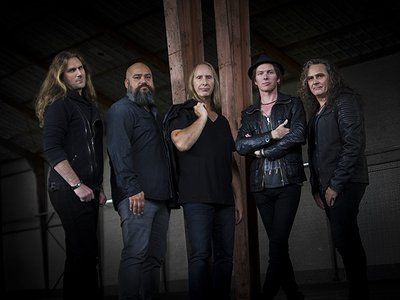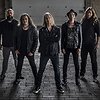Could you take us through a day in your life, from a possible morning routine through to your work? Do you have a fixed schedule? How do music and other aspects of your life feed back into each other - do you separate them or instead try to make them blend seamlessly?
It depends on whether I have got gigs or concerts to do, that ruins my schedule completely, with all the preparations and traveling. Such a waste of time, and it gets worse. When I am working on something, it does not leave my head until it is finished. I have to properly sit down behind keyboard and computer, and start working before actually accomplishing anything, but it is always there in the back of my mind. That must be pretty hard for people around me, especially my wife. I often give answers without hearing what’s been said, or give the impression that I heard what’s been said or asked. But she knows me and understands, luckily. And when in a creative mood, I am always looking for something I may use. That could be a sentence, a subject, or a musical pattern. Also, there is always music in my head. I do not know if that’s normal for a creative musician, probably not, but there is always a beat, a rhythm, a chord or note pattern, that I am hearing or tapping to. Usually it is not the best sort of music, unfortunately. Very monotone and repetitive, not worth recording really. I am used to it, but it does interfere with concentration on other, daily things. So yes, I try to separate them but it is difficult.
Could you describe your creative process on the basis of a piece or album that's particularly dear to you, please? Where did the ideas come from, how were they transformed in your mind, what did you start with and how do you refine these beginnings into the finished work of art?
It’s beginning to get difficult here, describing the creative process. Where does it come from? Is it a stream that I drink from? Was it always there, for me to pick up? I don’t know. I do know that I need one trigger, word, a melody, a chord sequence, whatever, to get me going. One thing leads to another. I have written songs in almost the time it takes to play it, others I worked on for weeks. But I am very associative, especially in lyrics. Sometimes I don’t really know what they are about until I am halfway. It is like carving a statue from a stone. The statue has always been there, but the stone around it needs to be cut out. Suddenly you see what it is.
Such a weird process. I feel I still know next to nothing about it, after 45 years. There are some practical things you learn along the way, sure. How to keep the attention going, harmonics, arrangements, that’s all practical. But every song I feel I am starting all over again. No guarantee it will be better than the first one I wrote. It gets more difficult, even. There’s only so many variations you can do, and what is the use of writing the same song again?
There are many descriptions of the ideal state of mind for being creative. What is it like for you? What supports this ideal state of mind and what are distractions? Are there strategies to enter into this state more easily?
Abstinence helps. I do not mean sexually, but just not being able to play and compose for a while. And not too much distraction, like phone or internet or doing my administration. But usually it is the eagerness to create something that wasn’t there before, to create a tiny little new world as it were, that gets me into that state of mind. I do not need help to get there.
How is playing live and writing music in the studio connected? What do you achieve and draw from each experience personally? How do you see the relationship between improvisation and composition in this regard?
If I have to chose, I would prefer only studio work and writing. I like to tour, in the sense of making a journey and communicating with people through the music, but not the hassle that comes with it. Organizing, getting your gear together, all that takes up so much time and energy, I hate that. The older you get, the more time you lose on things that are’t important it seems. Also, I see playing live as a different thing. It is not necessary to copy everything you did in the studio. For Kayak we would need like 10 musicians on stage to do that, and as we have only five, you know that is not going to happen. I don’t need to play live to feel good, I don’t miss the stage when I don’t play live, though I do enjoy a gig when it goes well. Improvisation and soloing is like quick composing to me. I do that very rarely, maybe I am not thinking fast enough. I don’t know how people can play solos for minutes and minutes. I get bored by myself, because I know what I can and can not do. ! Perhaps also because I like being in the background. I do not need a special spot on stage, in fact I could as well play in the dressing room while the rest of the band is on stage, I wouldn’t mind that.
How do you see the relationship between the 'sound' aspects of music and the 'composition' aspects? How do you work with sound and timbre to meet certain production ideas and in which way can certain sounds already take on compositional qualities?
Our sense of hearing shares intriguing connections to other senses. From your experience, what are some of the most inspiring overlaps between different senses - and what do they tell us about the way our senses work? What happens to sound at its outermost borders?
Your mind can play tricks on you. One of the things I noticed is that when you see something, you also hear it. Vice versa too, I would guess. Like in a music video: the instrument that is in the picture, can be heard more easily, though the volume in the mix is the same. You can even imagine hearing it, when you see it. So eyes and ears can deceive each other. A funny anecdote: a couple of decades back we did a special for Belgium tv. We asked the sound engineer: why do you have the guitar so loud in the mix, this is a keyboard solo here. He answered: well, that is because the director has the guitar on camera, so that should be loud. We felt it had no use discussing any further. Adjust the mix to what is showing on the screen is just silly in music.
Another effect of the connection between senses I had to think of is having goose bumps. Why does something that moves your senses, cause your skin to have goosebumps? I can like a painting, a book, a sculpture - but those have never given me goose bumps. Music is the most direct form of art, I mean on an emotional level. And within music it is the voice that is the most direct means of communication. It resonates with the heart. Or not, as the case may be. It is fascinating. The song can be great, a voice can be great - but the combination is unpredictable.
Art can be a purpose in its own right, but it can also directly feed back into everyday life, take on a social and political role and lead to more engagement. Can you describe your approach to art and being an artist?
I don’t want to connect politics with music. Music is or should be pure and uncompromised, everything that politics is not. That’s why politics sometimes like to use music - it gives politicians an aura of trustworthiness, of fairness, of hope of a better world. I haven’t discovered a political party yet I would lend my music to. I wouldn’t mind writing an anthem, though. "Starlight Dancer" could have been one. I love certain anthems, like our Wilhelmus despite the silly and outdated lyrics. Does that make me a nationalist? I don’t hope so.
It is remarkable, in a way, that we have arrived in the 21st century with the basic concept of music still intact. Do you have a vision of music, an idea of what music could be beyond its current form?
Help, I am hardly coping with its current form. There is music everywhere, cheap or even freely available - and devaluation is the price. I don’t see how that can change any time soon, with all the technology available. The only reason there is still music being released professionally may be that it also has become cheaper to make it.



